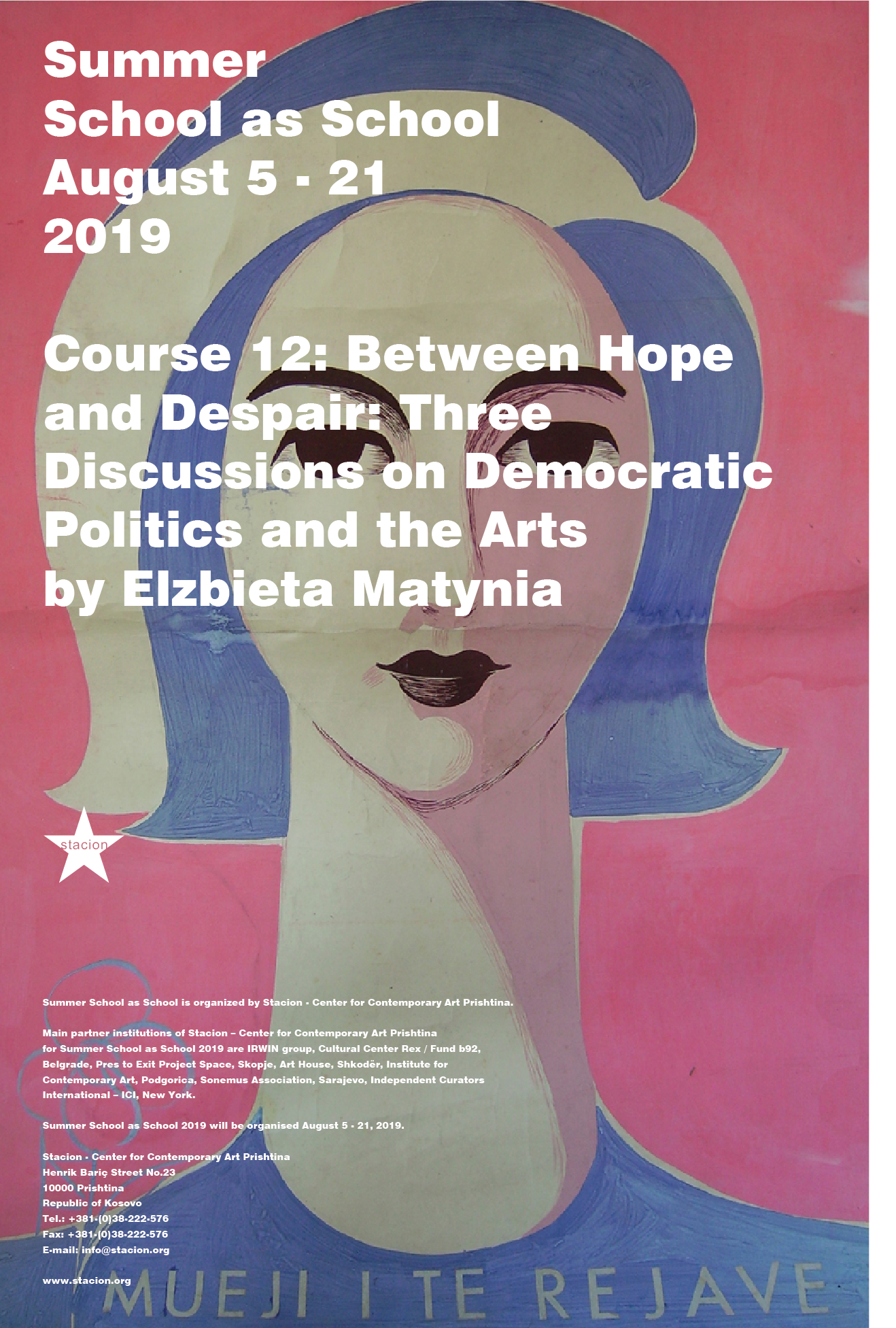
Course 12: Between Hope and Despair: Three discussions on democratic Politics and the arts
by Elzbieta Matynia
16 – 18 August, 2019
Course Description
We live in an uncanny era. It was exactly three decades ago, in 1989, that a new kind of revolutionary imaginary emerged, one that promised a new beginning, and demonstrated the possibility of comprehensive systemic change without bloodshed. Velvet or otherwise un-radical, this kind of revolution became a site of tangible hope, even in places where political violence still ruled. The speech-based performative capacities released civic creativity, and appeared to be truly transformative for those engaged, as it helped bowed backs straighten up.
Yet for freedom to become truly performative, not only in speech but in the public square, that is, the Arendtian “space of appearance”, is needed. Indeed, the relationships between active freedom and the public square are reciprocal, since without freedom, the public sphere shrinks, and eventually vanishes. What’s uncanny, though not unusual, is that the challenge to democratic politics comes from the very political environment that is enabled by still existing democratic frameworks and arrangements.
Today, when societal hope seems to be in a state of indisputable deficit wherever we live, this curse structured as a set of three seminar discussions is an invitation to explore both the factors that made it possible for hope to take root, and those that facilitated its unprecedented U-turn.
Are today's reversals of democracy in various parts of the world the necessary effect of the alienation caused by the representative mode of our democracies, manifestly relying on experts, incumbents and money? Do the restrictions to our freedom come just from surveillance, censorship and turbo-bureaucracy? Or is there, perhaps, a different way of looking at these reversals?
It is in times of crisis, like ours, that people sometimes try to conjure up hopeful images that can help them to envision possible solutions. The sources of such imagery are often from the arts, literature and oral history. Both visual arts and poetry are known for having such a capacity, as they can capture an otherwise inexpressible combination of the temporal and the spatial, of intellectual insight and emotion. Our main guide here will be the writings of Hannah Arendt, but also the way she organized her lectures in political philosophy with works of art at the center.
Seminar One: The Infrastructure of Public Hope: Performativity and Democratic Politics
In the first seminar (The Infrastructure of Public Hope: Performativity and Democratic Politics) we will explore a set of questions that -- although they appear general -- are designed to generate discussion on ideas and practices that make it possible for citizens to live meaningful and perhaps even happy lives. We will ask what conditions are that generate dignity rather than humiliation, trust rather than suspicion. What does it take for social hope to emerge and be sustained?
Seminar Two: Presentness of the Past: The Art of Public Memory and the Politics of History
In our second seminar (Presentness of the Past: The Art of Public Memory and the Politics of History) we will examine the politics of public memory, particularly tense at a time when political systems are being dismantled and reconfigured, ethnic and cultural identity is emerging as a powerful source of tensions and nation-states are being challenged by new global developments. In this session we will pay particular attention to representational strategies designed to elicit the meaning of memory sites and practices, whether in the realm of public art, community activities, memorial museums, tourist destinations, monuments or historic districts.
Seminar Three: The Story of Two Squares: Silencing, Violence and the End of Politics
Finally, we will address the question of public freedom. Freedom as such is not easily tangible. It is like the crisp air that allows us to breathe; only when it becomes alive and embodied can it appear in public. In this concluding seminar (The Story of Two Squares: Silencing, Violence and the End of Politics) we will ask what is happening to that freedom. What is happening to the freedom we achieved, or the promise of freedom we are still yearning for, whether we are Americans, Europeans, Latin Americans, Asians, Africans or New Zealanders? What is happening, and how to make sense of it?
The required readings include Thomas Mann, Paul Ricoeur, Vaclav Havel, Chantal Mouffe, Judith Butler, Jacques Ranciere, Adam Michnik , Bernard Crick, Achille Mbembe and others.
Biography
Polish-born Elzbieta Matynia is Professor of Sociology and Liberal Studies and director of the Transregional Center for Democratic Studies at the New School for Social Research in New York. Her research in the sociology of arts and politics focuses on democratic transformation, and more recently, retreats from democracy, in Eastern Europe and beyond, on the concept of borderlands in the new shared Europe, and more recently on the challenges faced by democracies emerging with a legacy of violence. Her two recent books bring together theater of politics, performance art and citizens’ agency. An Uncanny Era (Yale University Press, 2014) presents post-revolutionary conversations between Europe’s most emblematic former dissidents: Czech playwright and president Václav Havel, and Polish political thinker Adam Michnik. Her Performative Democracy (Paradigm, 2009) explores a potential in political life that easily escapes theorists: the indigenously inspired enacting of democracy by citizens. Written by one who experienced an emerging public sphere within pre-1989 Poland, it seeks to identify the conditions for performativity in public life.
Participation
10 Participants will be selected to participate in this course. Eligible participants must read the Terms, fill out the application form, upload the required documents and submit the application form. Incomplete applications will not be considered.
Scholarships are available for participants from Kosovo.
A limited number of scholarships, that cover the participation fee, are available for international participants.